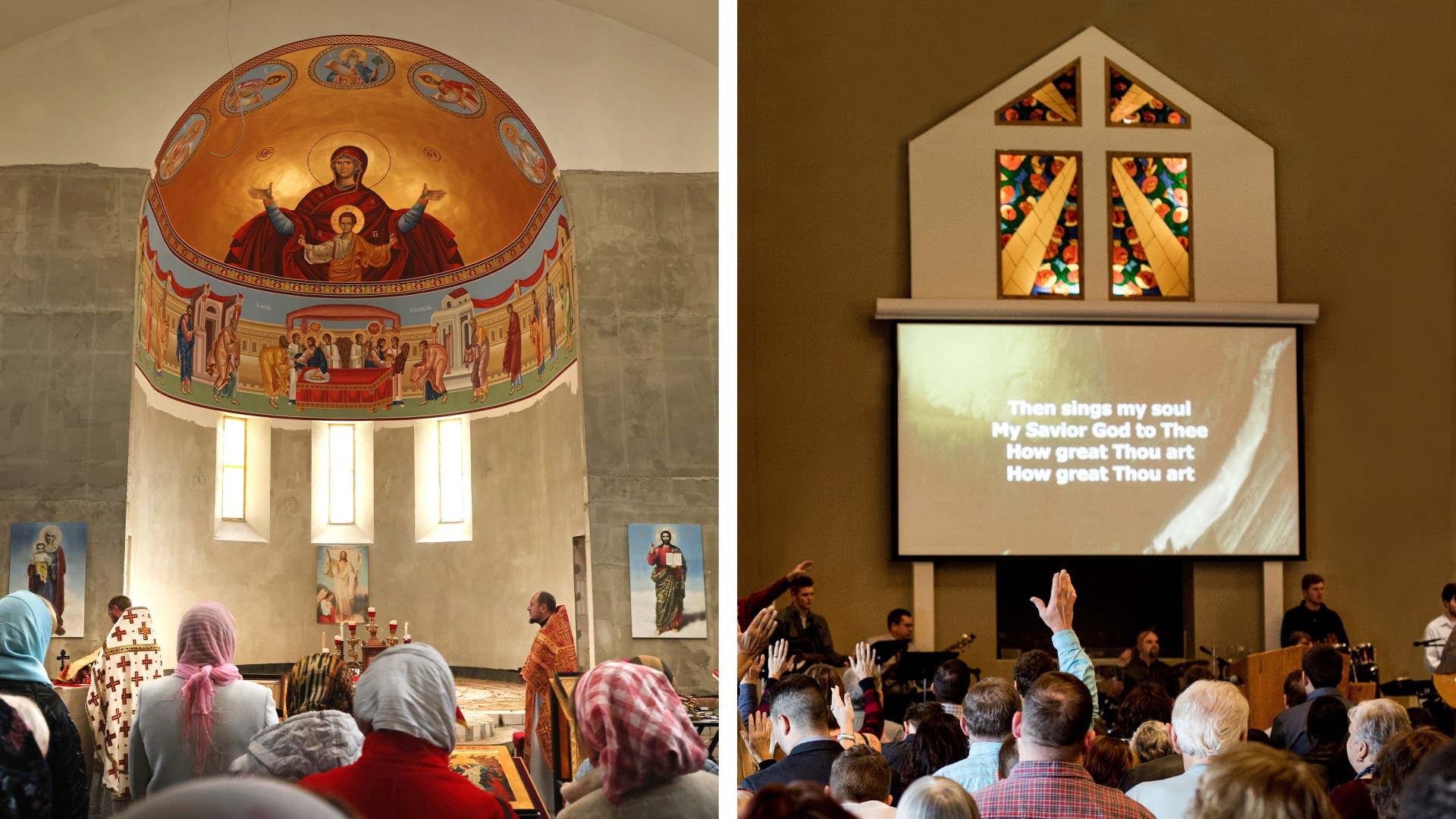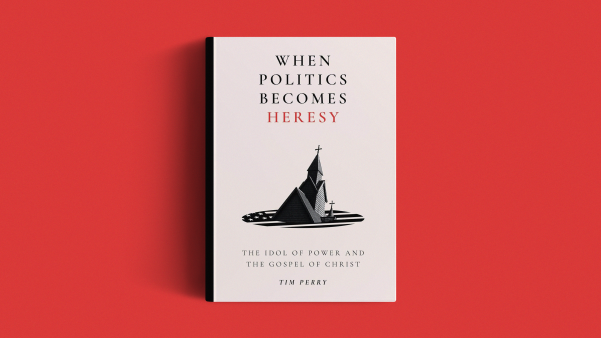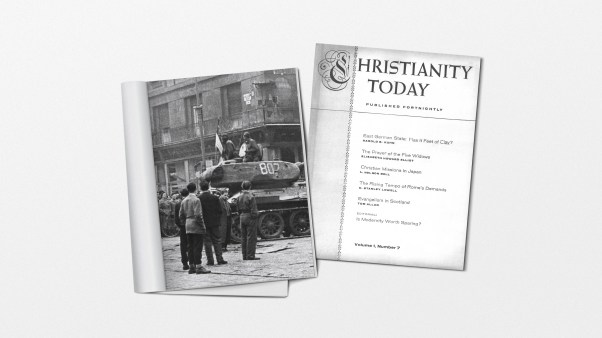Are evangelicals and Orthodox allies in the faith?
While both confess the Nicene Creed, Orthodoxy’s smaller population in the United States remains obscure to most American believers, especially when compared with Catholics. Many think of Orthodoxy as a nominal religion with empty cathedrals in Eastern Europe and Russia.
Yet there is also an awareness of not-insignificant numbers of evangelical converts to Orthodoxy, drawn by its ancient roots and sacramental practice.
Bradley Nassif knows both worlds. Raised in Kansas, where his Lebanese immigrant grandparents helped establish St. Mary’s Antiochian Orthodox Church, his spiritual transformation came through his local congregation, a Billy Graham sermon, and participation in a high school Bible study. But though he remained in his church of origin, he became an academic director at Fuller Seminary and is now professor of New Testament and Orthodox-Protestant dialogue at the California-based Antiochian House of Studies.
Oxford University professor John McGuckin said that Nassif, a leader in the Lausanne-Orthodox Initiative (LOI), is “the leading world expert” on Orthodox-Evangelical dialogue. CT talked with Nassif about his 2021 book, The Evangelical Theology of the Orthodox Church:
You have said, “I am Orthodox, and therefore evangelical.” How does Orthodoxy address the general markers of evangelical faith?
Eastern Orthodoxy embraces the classic Bebbington quadrilateral of biblicism, crucicentrism, conversionism, and activism, but transcends it through a maximalist vision of the Incarnation in its liturgical, sacramental, and spiritual life. The gospel permeates the church—not only about Jesus dying for our sins and the need for personal faith but including the whole story of Jesus from creation to consummation. This implies that the fullness, the catholicity, of the faith is formally present in the Orthodox church. So, yes, I am Orthodox, and therefore evangelical, in an incarnational, Trinitarian, wholistic sense of the word gospel.
What are the most significant theological differences between us?
Many are found in the way we appropriate the past and in our understanding of the nature of the church. Evangelicals and Orthodox share a common interest in Christian history, but the Orthodox are more organically linked to the past than our evangelical brothers and sisters, whose communities are only loosely connected to the fullness of the faith and polity of historic Christianity.
Evangelicals seem unaware that the early church is the Orthodox church. The congregations they meet in the pages of antiquity are treated as if they were an invisible body of believers, instead of a visible community of local Orthodox churches. Those churches shared the same faith and sacraments, led by bishops in communion with each other in apostolic succession, continuing to the present day.
In contrast, evangelicals stress the invisible body of Christ as the basis of unity and seem content to permit the visible disunity that exists in Christianity today. The Orthodox, however, maintain that this is a detrimental counter-witness to the truth of the gospel.
Another critical difference in mindset lies in the hermeneutics of biblical interpretation. We agree on the Bible as the source of divine revelation and the standard by which all claimed Christian belief must be evaluated. But we disagree on the role of the Christian community in testing our exegetical conclusions, in light of the apostolic tradition that has been handed down in the life of the church. The Holy Spirit inspired not only the writing of the Scriptures but also their interpretation.
That difference helps to account for why Orthodox churches have escaped the destructive aspects of liberal Protestant theology that permeate mainline denominations and progressive circles today. A reliance on Holy Tradition keeps biblical interpreters from an idolatrous confidence in their own exegetical conclusions, by testing them against the common faith of the wider Christian community.
Can there yet be an ancient and preserved consensus of error?
Not everything received from the past is of equal value or necessarily true. The Orthodox mind “follows the holy Fathers,” as stated in the preamble of the Chalcedonian Definition (A.D. 451), but it does not merely appeal to the past as if that alone is the source of truth. Antiquity itself is no proof of truth; it may simply be old error! To “follow the holy Fathers” is to embrace not only their witness to the faith, but also their method of theological reasoning.
For example, in the eighth century, the Orthodox world lived over 30 years with the understanding that icons were idolatrous. This decision was passed by bishops at the Council of Hieria but overturned in A.D. 787 by the Seventh Ecumenical Council in Nicaea. In both cases, the theological sources were the same: Scripture, previous councils, and tradition. The difference in outcome is attributed to the guidance of the Holy Spirit, bearing witness over time through reception in the church.
Here we touch upon the mystery of the Orthodox doctrine of the church, which Protestants and Catholics often find hard to understand. Neither Scripture nor pope is the sole criterion of truth. There is an inseparable link between the Holy Spirit living mysteriously in the church and its dogmas, worship, and spiritual life.
A beautiful flower might illustrate the point. Let’s say the roots of the flower represent the church. The church, in turn, connects to a stem, which represents doctrine, and from that doctrinal stem comes a beautiful flower, which is the church’s spiritual and liturgical life. The roots, stem, and flower all belong together.
But to embrace the doctrinal stem of the Nicene or Chalcedonian councils, as evangelicals do, while rejecting the root that produced it and the spiritual flower that blossoms forth from it, does violence to the organic integrity of the flower. It cuts off the stem from both its life-giving roots and spiritual flower. The Orthodox believe the Holy Spirit keeps the whole flower intact, for the life of one part belongs to the life of all.
 Courtesy of Lausanne-Orthodox Initiative
Courtesy of Lausanne-Orthodox InitiativeAre evangelicals in need of conversion to Orthodoxy?
Conversion is a word that properly refers to the new life given by God when one first becomes a Christian. In this sense, most evangelicals I know are already converted. But the question of changing one’s church affiliation is very personal, and each individual must answer for himself.
Orthodoxy believes that the church on earth must remain visibly united. So where does this leave evangelicals and other Christians who are not visibly united with it? Different Orthodox would answer in different ways.
A more rigorous group says that anyone who is not Orthodox does not belong to the church. Grace may be active in non-Orthodox churches, but they cannot be regarded as members of the church. Therefore, evangelicals, like everyone else, must convert and become Orthodox or risk losing out on salvation.
A more moderate group, however, believes that while there is only one church, there are many ways of being related to it. In this spirit I have no doubt that believing evangelicals are already in the Orthodox church, the body of Christ, even if they are visibly separated. This is not the witness God wants, but if anyone is “in Christ,” they must in some sense be “in the church.” A much fuller spiritual experience, however, can be found in the liturgical and sacramental life of the Orthodox church, for anyone who desires it.
Around the world, how many Orthodox are “therefore evangelical”?
All Orthodox are evangelical in doctrine but not always in practice. Too often, we live in a golden ghetto, surrounded by theological treasures but living in spiritual poverty. That’s the elephant in the room that goes back to at least the fourth century, when Christianity became the official religion of Rome. I’m not saying the union of church and state was inherently wrong, but it had liabilities, which include dead formalism and nominal faith.
The sermons of St. John Chrysostom offer eloquent testimony to the carnal state of the average Christian. Little has changed over the centuries since then. Fortunately, the rise of monasticism in the fourth century saved the integrity of Christianity by preserving the church’s evangelical spirit.
Nonetheless, we must honor the Orthodox for preserving the faith during the harsh persecution and social humiliation suffered under Islamic and Communist rule. But like a spring flower budding after the winter thaw, Orthodox Christianity is undergoing a renaissance in the 21st century.
And spiritually, although Orthodoxy in America shares the same challenge of nominalism that exists in traditional Orthodox lands, it appears more alive due largely to the renewing influence of evangelical converts. In many ways, the Orthodox church in America is in the best spiritual condition it has ever been.
Once it reawakens to the centrality of the gospel, what must the Orthodox church do differently to evangelize its own people?
Orthodoxy cannot nurture its people simply by offering more liturgies, lectures, and “try harder” sermons. Rather, a robust emphasis on the gospel must be made central in every life-giving action of the church—its preaching, liturgical rites, sacraments, missionary outreach, and educational curricula.
This isn’t rocket science; it’s an emphasis on the ABCs of the faith. Spiritual transformation starts at the beginning by renewing our baptismal vows through repentance and faith in Christ as Lord and Savior, relying on the empowerment of the Holy Spirit for Christian living.
Renewal comes to a parish one person at a time, so we begin with ourselves. Leaders and laity alike must ask if we have consciously embraced Jesus’ call to “take up the cross and follow” him (Mark 8:34).
The gift of salvation requires a response. People sometimes need a gentle question about where they stand in relation to Christ. That can happen throughout the liturgical year in sermons, counseling, Bible studies, home visits, or simply over a cup of coffee. Regardless of how it happens, internal evangelism and the call to discipleship are the prescriptions for a vibrant parish.
Is this necessary for their salvation from hell, or only for living the fullness of Christian life?
Only God knows! It depends on where each individual stands in relationship with God. Some think they are Christians just because they are from an Orthodox country; others are religious but lost. Many have been spiritually neglected and need pastoral care. Overall, Orthodox people are quite receptive to the gospel when it is presented clearly by a loving and trusted member of the church.
Just because the gospel is in the church doesn’t mean that our people have understood and appropriated its message. Our mystical teachers, such as St. Symeon (tenth century) and St. Makarios of Egypt (fourth century), remind us of the need for a conscious experience of God in the heart.
While repentance leads to this consciousness, for some the awareness of God’s life in the soul may come suddenly, while for others only gradually as they obey the commandments.
Especially in the Orthodox world, how can evangelicals assist this gospel message?
Evangelicals must first examine their own attitudes and goals. Do they believe Orthodoxy is not true Christianity? Do Orthodox need an evangelical conversion?
Missionaries can further their work in Orthodox lands by first learning as much as they can about the faith and its influence on the cultural heritage.
Monasticism, for example, is at its core the embodiment of Jesus’ call to “take up your cross and follow me” (Luke 9:23). Study the icons and the saints. Read Dostoevsky and listen to Tchaikovsky. Conversations around these topics are also a good way to build bridges with clergy.
Greater success among the Orthodox might come through a reminder of the gospel witness already present within the writings of their own cherished leaders.
Your book notes that evangelicals are sometimes discriminated against in the Orthodox world.
Recognizing the major concern over proselytism by evangelical missionaries in Orthodox lands, the Orthodox also need to understand who evangelicals are. Too often, they are lumped together indiscriminately with sects and cults who reject the divinity of Christ and the Holy Trinity.
I think the Lord would be pleased if more Orthodox leaders could understand the difference between the popular, sometimes less sophisticated forms of evangelicalism that appear on TV or the internet, and the respectable theological heritage of evangelical scholarship—such as that present in LOI.
But with or without an improved mutual understanding in Orthodox countries, faith is best served by protecting the rights of all people to exist without discrimination. Human and religious freedom lie at the heart of the biblical and patristic understanding of the image of God, because the only love worth receiving is a love that is freely given.
What is your hope for the unity of the church?
We are already united in Christ but that unity is imperfect—anything more requires full agreement in faith. But we cannot take Communion together, for example, since we believe so differently about the real presence of Christ in the Eucharist.
I do not believe Orthodox and evangelical Christians will ever become visibly united, and I am fine with that. There are too many differences that must not be minimized for the sake of superficial unity. Our imperfect unity, however, can have a more perfect witness by supporting our mutual proclamation of Christ as Lord and Savior.
We can do this through social action to help the poor, defense of the unborn child and monogamous heterosexual marriage, and the “cooperative evangelism” advocated by Billy Graham. Years ago, high-ranking Orthodox bishops publicly supported his campaigns in Russia and Romania, on the condition that all Orthodox people who came forward to dedicate their lives to Christ would be directed back to an Orthodox church for follow-up.
Together, may God give us such mutual humility and love, for the sake of Christ and his worldwide church.













